Overcoming Pharaoh's edict, Moses' parents' tale of faith and defiance sparks a legacy that continues to inspire and intrigue.
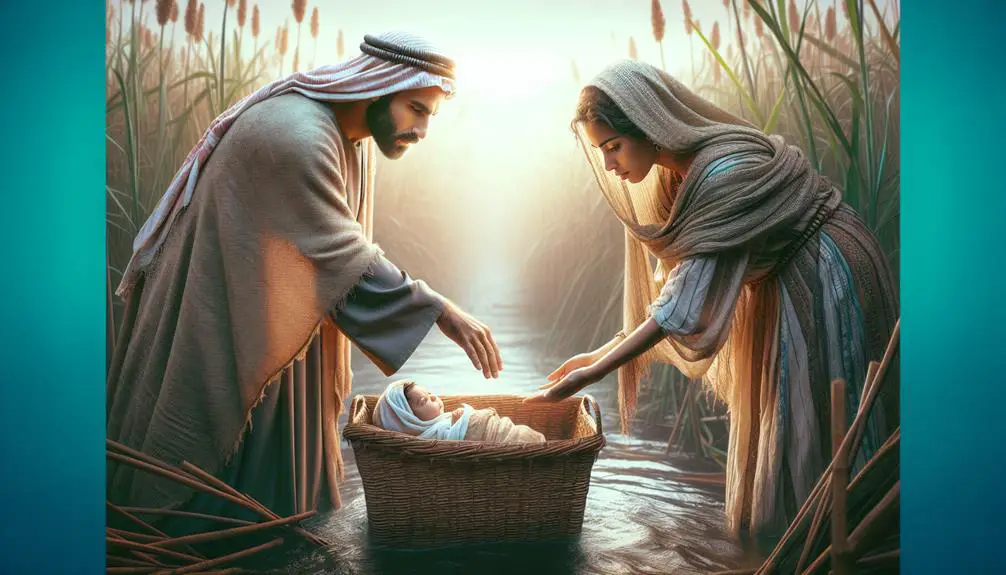
Moses Parents in the Bible
Just as a small spark can ignite a great fire, the story of Moses' parents, Amram and Jochebed, sets ablaze a narrative of faith and defiance in the face of tyranny.
You'll find that their courage under the shadow of Pharaoh's decree not only saved their son but also set in motion events that would change the course of history.
What's intriguing is how their actions echo the resilience and hope that many find relevant today.
As we peel back the layers of their story, you'll discover why their legacy of faith and courage continues to inspire.
Let's explore what made them stand out in a time of despair and how their decisions impact us.
Key Takeaways
- Amram and Jochebed, Moses' parents, belong to the Levitical lineage, highlighting a divine connection and leadership heritage.
- They faced Pharaoh's decree with faith, protecting Moses through divine guidance and clever planning.
- Jochebed's craftsmanship in creating the ark for Moses demonstrates maternal love and strategic survival.
- The compassionate act of Pharaoh's daughter, influenced by divine intervention, secured Moses' safety and future leadership role.
The Lineage of Amram and Jochebed
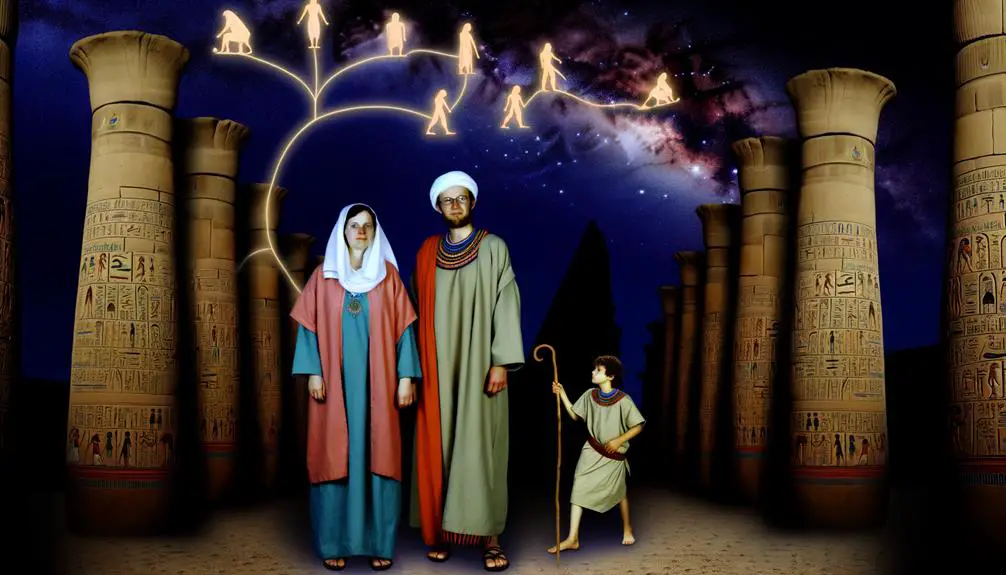
Amram and Jochebed, Moses' parents, hail from a lineage deeply rooted in the heart of Israel's history, embodying a legacy intertwined with divine purpose and the unfolding narrative of the Hebrew people. Their roots trace back to Levi, one of the twelve sons of Jacob, marking them as part of the prestigious Levitical lineage. This distinction isn't merely genealogical; it earmarks them within a societal role dedicated to religious and ceremonial duties in ancient Israel.
You'll find that their immediate ancestry, through Kohath's descent, further accentuates their significance. Kohath, the second son of Levi, positions Amram and Jochebed in a lineage that's not only Levitical but also directly connected to the guardianship of sacred traditions and the covenantal promises made to Abraham, Isaac, and Jacob. This lineage is emblematic of a fidelity to divine service, setting the stage for Moses' eventual role as a leader, lawgiver, and mediator between God and the Israelites.
Delving deeper, understanding this Levitical and Kohathite heritage is crucial. It's not just a background; it's a narrative framework that shapes Moses' identity and mission. The Levitical lineage, with its distinct priestly and service-oriented calling, prefigures the leadership and dedication required for Moses to fulfill his destiny. Moreover, Kohath's descent emphasizes a closeness to the sacred, a lineage that literally carries the divine presence through the Ark of the Covenant.
In essence, Amram and Jochebed's lineage is a testament to the continuity and resilience of a people chosen for a divine purpose. It's a heritage that encapsulates duty, devotion, and the enduring promise of deliverance and covenant.
The Decree of Pharaoh
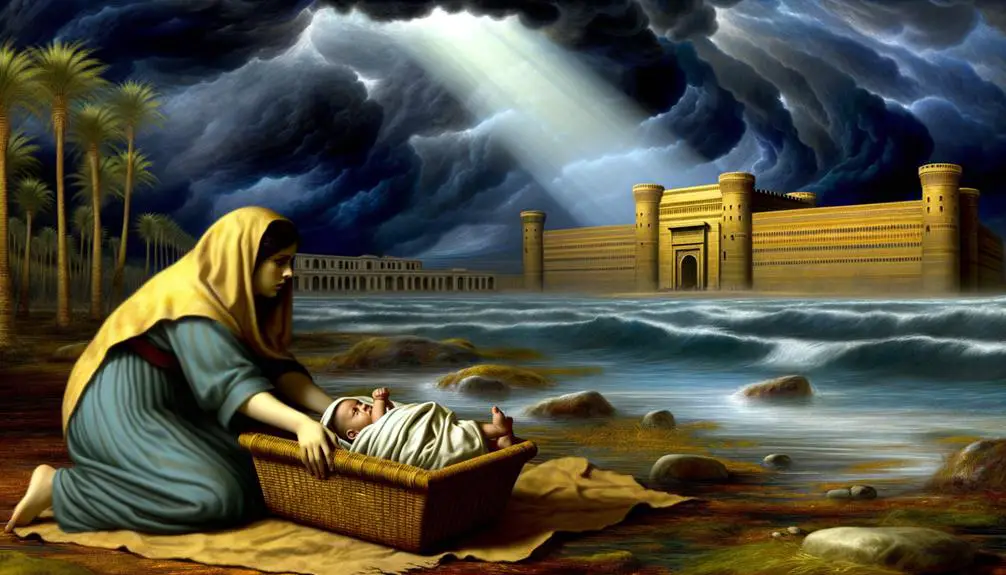
Within this context of lineage and divine purpose, the decree of Pharaoh emerges as a pivotal challenge to the survival and destiny of Moses' family. Pharaoh's motivation, deeply entrenched in Egyptian culture and the socio-political landscape of the time, was to curb the burgeoning population of the Israelites, whom he perceived as a threat to Egyptian sovereignty. This fear led him to issue a cruel edict that all newborn Hebrew boys were to be killed, an act that showcased not only his desperation to maintain power but also the value systems that underpinned ancient Egyptian society.
Analyzing this decree, it's clear that Pharaoh's actions weren't merely impulsive but were rooted in a calculated attempt to suppress any potential uprising. The Hebrews' increasing numbers could destabilize the delicate balance of power, and Pharaoh's decision to target the male offspring specifically speaks to a strategy aimed at eroding the future strength of the Israelites. This approach reflects a broader understanding within Egyptian culture of the importance of lineage and legacy, as well as the central role of the male figure within the family and society at large.
The decree itself serves as a testament to the lengths to which those in power will go to protect their dominion, highlighting the intersection of fear, governance, and cultural norms. For Moses' parents, Amram and Jochebed, the edict represented not just a personal threat to their son's life but a challenge to their faith and the promises bestowed upon their ancestors. Their response, as we shall see, underscores the resilience and ingenuity that often emerge in the face of oppression.
The Birth of Moses
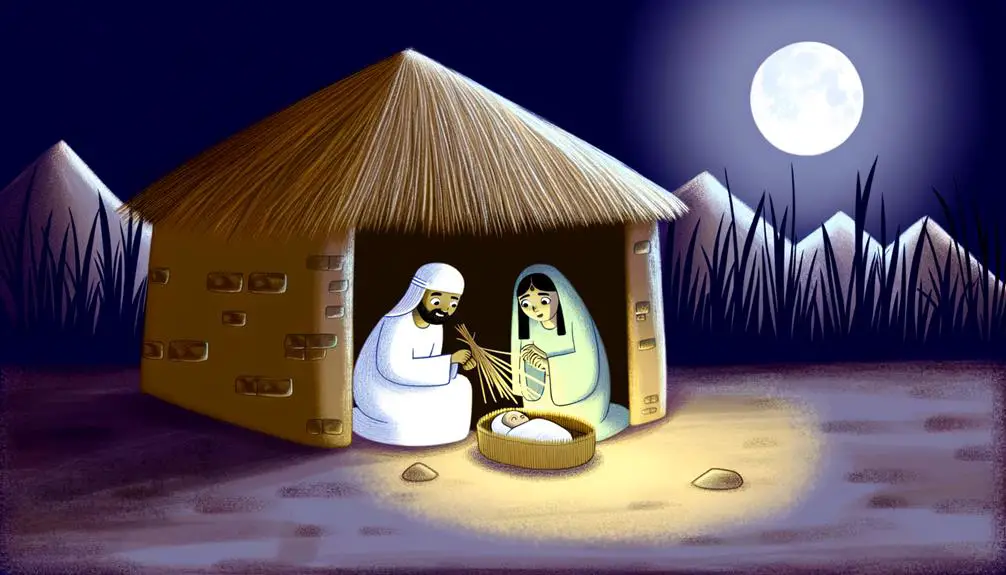
You must understand that Moses' birth occurs under the shadow of Pharaoh's harsh decree, mandating the death of Hebrew male infants.
This decree sets the stage for his miraculous discovery in the river, highlighting the vulnerability and divine protection surrounding his early life.
His sister plays a critical role in ensuring his safety, showcasing the importance of familial bonds and quick thinking in times of crisis.
Pharaoh's Harsh Decree
Fear and control prompted the Pharaoh to issue a harsh decree, commanding all newborn Hebrew boys to be thrown into the Nile, profoundly impacting Moses' birth and early life. This extreme measure, emblematic of Egyptian oppression, was rooted in Pharaoh's dread of the burgeoning Hebrew population potentially allying with Egypt's enemies.
However, this oppressive act inadvertently showcased Hebrew resilience. Moses' family, undeterred by the looming threat, devised a courageous plan to save their son. Their actions underscore a critical theme: resilience in the face of tyranny.
The decree, meant to weaken, instead catalyzed a defining moment in Hebrew history, revealing the indomitable spirit of a people destined to challenge and survive the harsh edicts of their oppressors.
Miraculous River Discovery
In the shadow of Pharaoh's oppressive decree, Moses' birth unfolded into a narrative marked by divine intervention and a mother's ingenious resolve, leading to his miraculous discovery along the Nile. She crafted a basket with exceptional skill, a testament to ancient basket weaving techniques. This basket was not only a cradle but also a vessel, navigating the perilous currents of the Nile, ensuring Moses' safety amidst danger.
Aspect |
Detail |
Significance |
|---|---|---|
River Navigation |
Moses' basket journey |
Demonstrated divine guidance |
Basket Weaving |
Craftsmanship for survival |
Symbol of maternal love |
Divine Intervention |
Protected Moses on the Nile |
Underscored a destined path |
Historical Context |
Pharaoh's decree backdrop |
Highlighted the stakes |
This event isn't just a tale of survival; it's a profound demonstration of faith, ingenuity, and the subtle workings of destiny.
Protective Sister's Role
Amidst the narrative of Moses' early life, his sister's vigilant role emerges as a pivotal element of his survival, showcasing a blend of sibling loyalty and divine orchestration. Her protective strategies underscore the importance of sibling dynamics in ensuring Moses' safety amid perilous times. To paint a clearer picture:
- She meticulously devised a plan to safeguard her brother.
- Monitored his makeshift river cradle from a distance.
- Skillfully engaged Pharaoh's daughter, displaying remarkable diplomacy.
- Orchestrated a reunion with their mother under the guise of a nursemaid.
- Demonstrated unparalleled foresight in anticipating potential threats to Moses.
This narrative not only highlights her critical role but also sets a precedent for protective strategies within sibling dynamics, blending familial loyalty with sharp acumen.
The Ark on the Nile

To ensure her son's safety from the Pharaoh's decree, Moses' mother crafted an ark of bulrushes, placing him within it on the Nile's banks. This act wasn't just a desperate attempt at saving her child, but a calculated move that leveraged her knowledge of river navigation and basket construction. The choice of bulrushes for the ark's material was deliberate. These aquatic plants, abundant along the Nile, are known for their buoyancy and water-resistant properties, making them ideal for constructing a vessel that needed to float and protect its precious cargo.
The construction of the ark itself was a feat of engineering. Moses' mother wove the bulrushes tightly, creating a compact basket that could withstand the Nile's currents while remaining afloat. She further waterproofed it with bitumen and pitch, substances known for their sealing properties, ensuring that water wouldn't seep in and sink the vessel. Her understanding of the river's dynamics was also critical. She placed the ark where the current was gentle enough not to overturn it but strong enough to carry it towards a location where it could be found.
This careful planning reflects not only a mother's love but also a deep understanding of her environment. The ark on the Nile wasn't just a basket; it was a meticulously crafted vessel, designed for survival in a specific context. Moses' mother's actions demonstrate a profound comprehension of river navigation and basket construction, emphasizing her resourcefulness and determination to save her son.
Pharaoh's Daughter and Moses
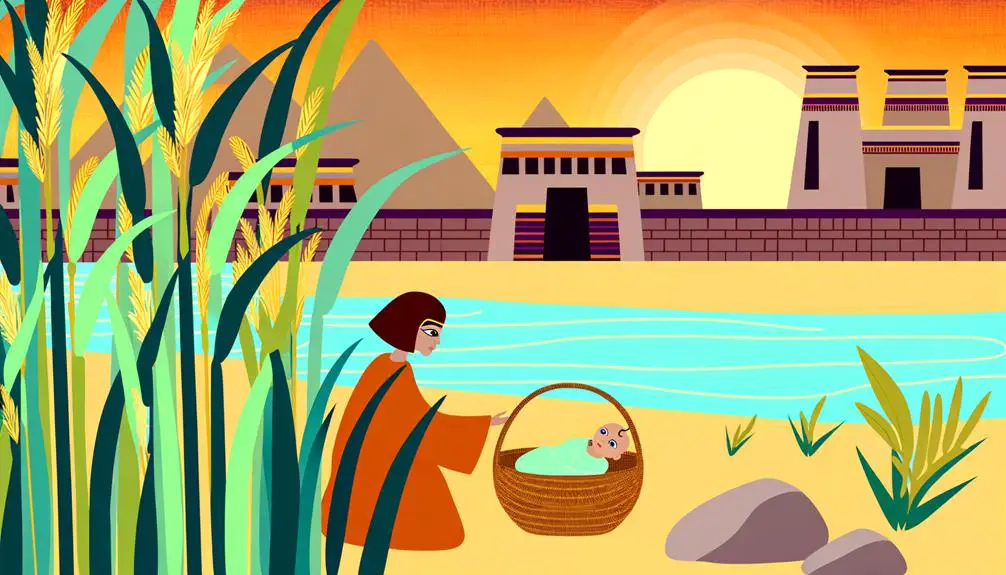
Upon discovering the ark nestled among the reeds along the Nile's bank, Pharaoh's daughter unknowingly set in motion a series of events that would alter the course of Moses' life. Her decision to adopt Moses raises intriguing questions about adoption ethics and cultural assimilation within ancient societies.
- Moment of Discovery: Pharaoh's daughter finds a Hebrew baby, defying her father's decree to drown all Hebrew male infants.
- Decision to Adopt: Chooses compassion over compliance, adopting the child as her own, thus saving his life.
- Cultural Assimilation: Moses grows up with Egyptian privileges, education, and religion, starkly different from his Hebrew heritage.
- Identity and Belonging: Despite his assimilation, Moses' early life is marked by a dual identity, bridging two distinct cultures.
- Ethical Considerations: The adoption intertwines with issues of power dynamics, consent, and the rights of biological versus adoptive parents.
The act of adopting Moses not only showcases Pharaoh's daughter's defiance of her father's orders but also highlights the complexities surrounding adoption ethics. The power dynamic at play, with a member of the ruling class adopting a child from an oppressed minority, adds layers of complexity to the narrative. Moreover, Moses' cultural assimilation into Egyptian society is both a survival mechanism and a source of identity conflict. As he grows up in the Pharaoh's palace, educated as an Egyptian, the question of his true heritage looms large, setting the stage for his eventual return to his people.
This story, rich in themes of adoption, ethics, and cultural assimilation, serves as a profound exploration of identity, belonging, and the forces that shape us.
The Reunion of Moses and Jochebed
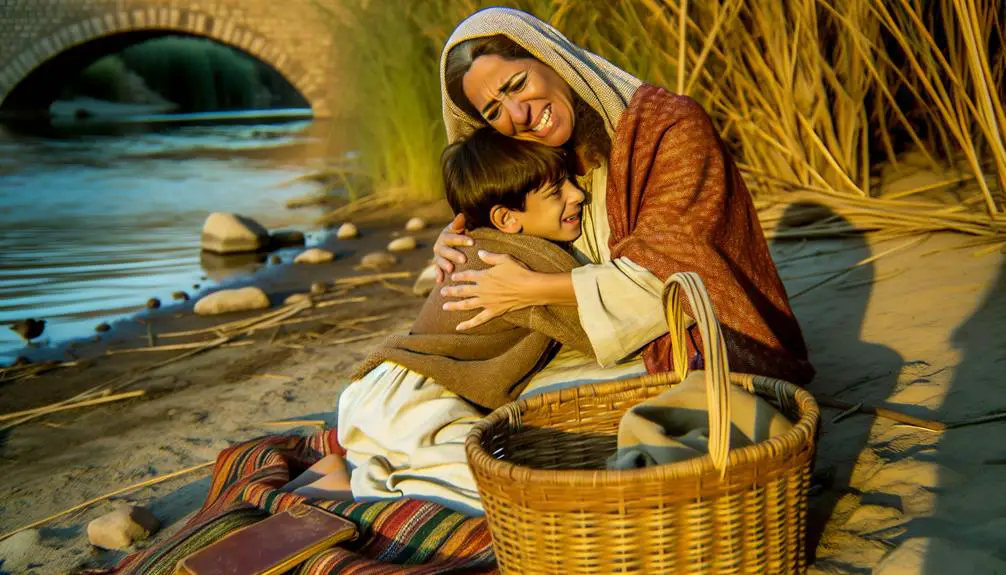
The reunion of Moses and Jochebed is a narrative rich in emotional depth and theological significance. It showcases Jochebed's courageous act of entrusting her son to the Nile, which eventually leads to his discovery by the Pharaoh's daughter. This providential act not only spares Moses' life but also forges a clandestine bond between mother and son, as Jochebed is brought back to nurse her own child.
You'll find that this reunion underscores the themes of faith, providence, and the enduring strength of maternal love within the broader Exodus narrative.
Jochebed's Courageous Act
In a bold move of faith, Jochebed placed her infant son Moses in a basket on the Nile, setting the stage for a remarkable reunion that would defy the oppressive edicts of the Pharaoh. This act not only highlights Jochebed's unshakeable trust in a higher power but also introduces complex ethical dilemmas and adoption narratives central to Moses' story.
- Ethical dilemmas: Jochebed's decision opens a discourse on maternal sacrifice and the lengths a parent will go to save their child.
- Adoption narratives: This event foreshadows Moses' eventual adoption into Egyptian royalty, challenging traditional family structures.
- Faith over fear: Demonstrates the power of faith over the paralyzing fear of losing one's child.
- Strategic planning: Illustrates the cunning it took to ensure Moses' survival against all odds.
- Cultural defiance: Acts as a form of silent protest against the Pharaoh's decree, showcasing resilience and hope.
The Pharaoh's Daughter Discovery
Discovering Moses' basket among the reeds, Pharaoh's daughter's intervention sets in motion a series of events that not only saves a life but also reunites a child with his biological mother under extraordinary circumstances. This act underscores the intricacies of historical accuracy and adoption practices within ancient societies.
Element |
Emotion |
Significance |
|---|---|---|
Discovery |
Surprise |
A pivotal moment in Moses' survival. |
Intervention |
Compassion |
Pharaoh's daughter's empathy changes fate. |
Reunion |
Joy |
Jochebed regains her son in a rare twist. |
Adoption Practices |
Reflectiveness |
Highlights ancient and divine providence. |
Analyzing this, you realize the profound impact of one compassionate act, setting the stage for Moses' destiny and shining a light on the adoption practices of the time.
Mother-Son Secret Bond
Reflecting on the compassionate intervention by Pharaoh's daughter, let's now explore the profound mother-son secret bond forged between Moses and Jochebed upon their reunion.
- Maternal instincts played a pivotal role in Jochebed's fearless actions to ensure her son's survival.
- Child psychology reveals the importance of early bonding experiences in shaping trust and security in relationships.
The secrecy of their bond highlights the resilience and adaptability of maternal love under oppressive circumstances.
Their reunion symbolizes a defiance against the decree of Pharaoh, showcasing the power of faith and family ties.
This bond between Moses and Jochebed underscores the foundational role of motherhood in nurturing leaders and prophets.
Analyzing this reunion through the lens of child psychology and maternal instincts provides a deeper understanding of its significance in Moses' life and leadership.
Legacy of Faith and Courage

Moses' parents, Amram and Jochebed, exemplify a profound legacy of faith and courage through their daring actions amidst oppressive circumstances. Their story isn't just a tale; it's a testament to what you can endure and achieve with a steadfast spirit. Through their faithful resilience, they stood firm in their beliefs, despite the risk of severe punishment. This unwavering faith wasn't passive; it was active, driving them to make decisions that would ensure their son's survival and future leadership.
Their courageous defiance against the Pharaoh's decree to kill all Hebrew male infants showcases a remarkable strength and willingness to fight for what's right, regardless of the potential consequences. It's a striking lesson in how courage isn't the absence of fear, but the determination to act in spite of it. This aspect of their legacy teaches you that standing up for your beliefs and those you love may require sacrifices, but it's these sacrifices that define your character and your faith.
Amram and Jochebed's actions laid the groundwork for Moses to become a pivotal figure in biblical history. Their legacy of faith and courage didn't just impact their immediate family; it influenced the course of an entire nation. You're encouraged to reflect on this legacy in your life, recognizing that faith and courage aren't merely virtues to admire but essential principles to live by. Emulating their example can inspire you to face your challenges with a similar spirit of resilience and defiance, knowing that your actions today can shape the legacies of tomorrow.
Frequently Asked Questions
How Did the Political and Social Climate of Egypt at the Time Influence the Lives of Moses' Parents, Beyond the Pharaoh's Decree?
You're diving into how Egypt's political and social atmosphere, aside from the Pharaoh's decree, shaped lives.
Economic conditions and slave demographics were crucial. Harsh economic strains forced many into slavery, swelling slave numbers. This demographic shift heightened tensions and insecurity among Egypt's elite, fearing uprisings.
Consequently, oppressive policies intensified, directly affecting lives like those of Moses' parents by harshening their conditions and limiting their freedoms, illustrating the broader impact of such societal dynamics.
What Were the Cultural and Religious Backgrounds of Amram and Jochebed, and How Did These Influence Their Decision-Making?
You're exploring how parental faith and cultural resilience shape decisions. Remarkably, among ancient communities, it's estimated over 90% relied on such values for survival and guidance.
Amram and Jochebed, deeply rooted in their Hebrew beliefs and traditions, exemplified this. Their choices, driven by a firm faith and a culture of resilience against oppression, highlight the profound impact of one's spiritual and cultural background on critical life decisions.
This analytical perspective underscores the significance of their legacy.
Are There Any Extra-Biblical Sources or Archaeological Findings That Corroborate the Existence or Life Details of Moses' Parents?
You're looking for historical verification to flesh out the parental anonymity surrounding figures from ancient texts. Unfortunately, there's a glaring lack of extra-biblical sources and archaeological evidence that directly corroborates the existence or specific life details of these individuals.
While this absence might seem discouraging, it's not uncommon in ancient history, where many accounts and characters are preserved primarily through oral traditions or religious texts, rather than external historical records.
How Did the Story of Moses' Parents and Their Faith Impact the Early Christian Church or Other Religious Traditions Outside of Judaism?
You're exploring how parental faith and religious influence shape traditions.
Specifically, Moses' parents' story profoundly impacted early Christianity and other faiths outside Judaism. Their unwavering faith in God, despite daunting challenges, became a beacon of hope and trust for many.
This narrative fostered a deeper appreciation for faith's role in overcoming adversity, influencing religious teachings and practices.
Their story is a testament to the power of belief across diverse religious landscapes.
What Are the Psychological Implications of Moses Being Raised by Pharaoh's Daughter on His Identity and Relationship With His Hebrew Heritage and Parents?
Imagine being raised in a world that's the polar opposite of your birthright. This scenario can trigger an identity crisis, as you're caught between two conflicting cultures.
For Moses, being raised by Pharaoh's daughter placed him at the heart of such a crisis, deeply affecting his connection to his Hebrew heritage and parents. Analyzing this, it's clear how it honed his leadership qualities, preparing him for the monumental task of leading his people to freedom.
Conclusion
In the tapestry of biblical history, Amram and Jochebed emerge as threads of resilience, weaving a legacy through Moses that ripples across time. Their act of faith, placing their child upon the Nile, blossomed into a saga of liberation.
As architects of a divine narrative, they remind us that courage anchored in faith can defy empires. Their story, a beacon through the ages, illuminates the power of belief to chart courses through tumultuous waters, guiding us toward our own promised lands.



Sign up